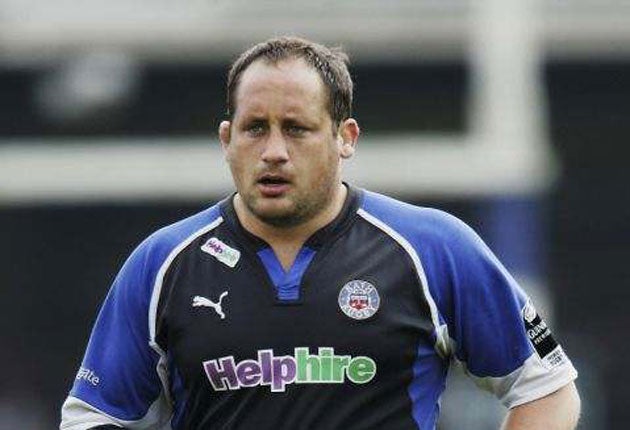RFU advised to allow blood on pitch to beat cheats
Task group also calls for 'rolling' substitutions in response to Quins scandal

The Rugby Football Union, deeply angered by the fake blood scandal at Harlequins, will consider a raft of far-reaching proposals aimed at eradicating cheating and sharp practice in the so-called "game for gentlemen". These include allowing bloodied players to remain on the pitch, sanctioning the use of local anaesthetic on minor injuries on the day of a match and, most radically, introducing "rolling" substitutions – a development that would wholly transform the nature of the sport.
Yesterday, the RFU's "task group" – a gathering of the great, the good and the all-too-human, including the former England captain Lawrence Dallaglio – published the findings of a month-long investigation into the extent of sporting chicanery at the country's 2,000-plus clubs. Inevitably, in light of events at the Stoop last April and their painful aftermath, attention was concentrated on the situation at professional level, and while the task group argued strongly that cheating was neither widespread not systemic, some of the findings in a veritable doorstop of a document (138 pages of commentary, statistics and appendices) made for uncomfortable reading.
Only 23 per cent of professional players responded to the group's questionnaire, despite assurances of anonymity. David Barnes, the Bath prop who doubles as chairman of the players' union, brushed aside suggestions that 77 per cent of his membership might have something to hide – "We didn't want people to feel press-ganged into responding in a way that was false," he said, claiming that the figure was a "representative sample" – but there was a feeling of alarm nevertheless.
That discomfort was not eased by the extraordinary discrepancy in the responses on the fabrication of blood injuries – precisely the issue that brought Harlequins to their knees during the summer. Almost 90 cent of Premiership players who replied said they had never witnessed malpractice of this kind, yet two per cent claimed to have seen it often. A cynic might draw the conclusion that the vast majority of those playing for clubs where such practices are commonplace declined the opportunity to say so.
There was a greater admission of guilt over the fabrication of injury to front-row players in an effort to secure uncontested scrums. Almost half of those responding said they had personally witnessed or participated in this form of cheating, while 27 per cent of a second group – coaches, medics and physiotherapists – confessed to having done so in Premiership and European matches. This issue has been partially addressed by the introduction of an extra front-row replacement in the English, French and Italian domestic leagues, together with the Heineken Cup and Amlin Challenge Cup tournaments, but the Celtic nations have refused to follow suit in the Magners League and there is no sign of such a move at Test level.
Other lowlights of the report included the startling statistic that almost 40 per cent of those Premiership players taking part in the survey have been "made to play" with injuries against medical advice or their own wishes. Any moves towards a solution were stillborn. "The task group felt that this area was outwith their terms of reference and did not discuss it further," members said in their report.
In all, 16 recommendations will be put to the RFU's management board and, where appropriate, to the game's supreme governing body, the International Rugby Board. The most eye-catching of these concern substitutions, together with a loosening of the regulations on the use of local anaesthetic on match day. This is currently outlawed by the IRB, a ban widely considered to be unpoliceable and frequently ignored.
By allowing players suffering minor blood injuries to stay on the pitch, the task group argue that the move would minimise the opportunity for coaches to make illicit changes of personnel. By the same yardstick, they feel the introduction of a system of rolling substitutions, under which players could take and leave the field much more freely, might eliminate many areas of abuse.
"We're not saying rolling subs should definitely be brought in," commented Dallaglio, "but we currently have situations where a concussed player finds himself staying on the field because there is no time for a doctor to examine the extent of his injury. That clearly raises a serious welfare issue."
Join our commenting forum
Join thought-provoking conversations, follow other Independent readers and see their replies
Comments
Bookmark popover
Removed from bookmarks